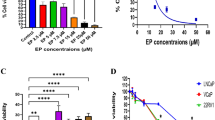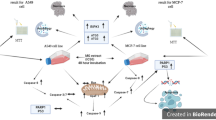Abstract
Breast cancer is a significant health problem worldwide, and the search for effective treatments is critical. Side effects of cancer treatments such as surgery, radiotherapy, and chemotherapy reduce the patient’s standard of living. Recently, natural compounds from plants have gained attention as potential anticancer agents due to their safety, low toxicity, and potential efficacy. Lycopodium Clavatum (LC) is an herb abundant in tropical regions and Europe and is known for its various medicinal properties. In this study, we investigated the cytotoxic and apoptotic effects of LC Water Extract (LC-WE) and LC Ethanol Extract (LC-EE) plant extracts on MCF-7 human breast cancer cells. Our results showed that LC treatment led to a dose and time-dependent cytotoxic effect on MCF-7 cells, indicating its potential as an anticancer agent against human breast cancer. Additionally, we observed that LC treatment activated apoptosis-related proteins, including BAX, Caspase-3, and Caspase-9. These results suggest that LC may induce apoptosis as a mechanism underlying its cytotoxic effect on MCF-7 human breast cancer cells. Previous studies have shown the anti-cancer potential of LC against different types of cancer. However, the anti-cancer effect of LC on human breast cancer cells has not been investigated to date. Therefore, our study provides novel insights into the potential of LC as an anti-cancer agent against breast cancer. Overall, our results highlight the potential of LC as a promising natural compound for breast cancer treatment.
Graphical abstract







Similar content being viewed by others
References
WHO. “Breast cancer now most common form of cancer: WHO taking action.” WHO. https://www.who.int/news/item/03-02-2021-breast-cancer-now-most-common-form-of-cancer-who-taking-action. Accessed 3 Mar 2023.
Fisusi FA, Akala EO. “Drug combinations in breast cancer therapy”, (in eng). Pharm Nanotechnol. 2019;7(1):3–23. https://doi.org/10.2174/2211738507666190122111224.
Emens LA, Middleton G. “The interplay of immunotherapy and chemotherapy: harnessing potential synergies”, (in eng). Cancer Immunol Res. 2015;3(5):436–43. https://doi.org/10.1158/2326-6066.Cir-15-0064.
Das S, Das J, Samadder A, Boujedaini N, Khuda-Bukhsh AR. “Apigenin-induced apoptosis in A375 and A549 cells through selective action and dysfunction of mitochondria”, (in eng). Exp Biol Med (Maywood). 2012;237(12):1433–48. https://doi.org/10.1258/ebm.2012.012148.
Banerjee JN, Biswas S, Madhu NR, Karmakar SR, Biswas SJ. A better understanding of pharmacological activities and uses of phytochemicals of Lycopodium clavatum: a review. J Pharm Phytochem. 2014;3:207–10.
Ma X, Gang DR. “The Lycopodium alkaloids”, (in eng). Nat Prod Rep. 2004;21(6):752–72. https://doi.org/10.1039/b409720n.
Thomasson MJ, et al. Sporopollenin exine capsules (SpECs) derived from Lycopodium clavatum provide practical antioxidant properties by retarding rancidification of an ω-3 oil. Ind Crops Prod. 2020;154:112714. https://doi.org/10.1016/j.indcrop.2020.112714.
Mandal SK, et al. “Lycopodine from Lycopodium clavatum extract inhibits proliferation of HeLa cells through induction of apoptosis via caspase-3 activation”, (in eng). Eur J Pharmacol. 2010;626(2–3):115–22. https://doi.org/10.1016/j.ejphar.2009.09.033.
Pathak S, Banerjee A, Paul S, Khuda-Bukhsh AR. “Protective potentials of a plant extract (Lycopodium clavatum) on mice chronically fed hepato-carcinogens”, (in eng). Indian J Exp Biol. 2009;47(7):602–7.
Wang H, Tang XC. “Anticholinesterase effects of huperzine A, E2020, and tacrine in rats”, (in eng). Zhongguo Yao Li Xue Bao. 1998;19(1):27–30.
Samadder A, Das S, Das J, Paul A, Boujedaini N, Khuda-Bukhsh AR. The potentized homeopathic drug, Lycopodium clavatum (5C and 15C) has anti-cancer effect on HeLa cells in vitro. J Acupunct Meridian Stud. 2013;6(4):180–7. https://doi.org/10.1016/j.jams.2013.04.004.
Banerjee A, Pathak S, Jothimani G, Roy S. Antiproliferative effects of combinational therapy of Lycopodium clavatum and quercetin in colon cancer cells”, (in eng). J Basic Clin Physiol Pharmacol. 2020. https://doi.org/10.1515/jbcpp-2019-0193.
Rai NK, Tripathi K, Sharma D, Shukla VK. Apoptosis: A Basic Physiologic Process in Wound Healing. Int J Low Extrem Wounds. 2005;4(3):138–44. https://doi.org/10.1177/1534734605280018.
Kuida K. “Caspase-9”, (in eng). Int J Biochem Cell Biol. 2000;32(2):121–4. https://doi.org/10.1016/s1357-2725(99)00024-2.
Porter AG, Jänicke RU. “Emerging roles of caspase-3 in apoptosis”, (in eng). Cell Death Differ. 1999;6(2):99–104. https://doi.org/10.1038/sj.cdd.4400476.
Jensen K, WuWong DJ, Wong S, Matsuyama M, Matsuyama S. “Pharmacological inhibition of Bax-induced cell death: Bax-inhibiting peptides and small compounds inhibiting Bax”, (in eng). Exp Biol Med (Maywood). 2019;244(8):621–9. https://doi.org/10.1177/1535370219833624.
Mu S, et al. Transdermal permeation research of ethanol extracts from Lycopodium clavatum. IOP Conf Ser Earth Environ Sci. 2020;559(1):012026. https://doi.org/10.1088/1755-1315/559/1/012026.
Pathak S, Banerjee A, Khuda-Bukhsh A. Efficacy of ethanolic spore extract of Lycopodium clavatum in reducing induced hepatotoxicity and genotoxicity in mice. Int J Biol Chem Sci. 2010. https://doi.org/10.4314/ijbcs.v4i3.60510.
Paramita P, et al. “Evaluation of potential anti-cancer activity of cationic liposomal nanoformulated Lycopodium clavatum in colon cancer cells”, (in eng). IET Nanobiotechnol. 2018;12(6):727–32. https://doi.org/10.1049/iet-nbt.2017.0106.
Kar F, Özyurt D, Öztürk B. The effects of optimization methods on the determination of total antioxidant capacity in some plants. Fresenius Environ Bull. 2019;28:6589–95.
Acknowledgements
We would like to thank Yozgat Bozok University Project Coordination Application and Research Center (Grant Number TGA-2022-982) for their financial support. We appreciate Assoc. Dr. Bala Gür Dedeoğlu for giving the MCF-7 human breast cancer cell line. We want to thank Ankara University Biotechnology Institute, whose infrastructure was used during the study.
Funding
This study was supported by the Yozgat Bozok University Project Coordination Application and Research Center under Grant Number TGA-2022-982.
Author information
Authors and Affiliations
Contributions
Conceptualization, YK, MD; methodology, YK, MD; investigation, YK, MD, EGA, and HY; formal analysis, YK, MD, writing-original draft preparation, YK, MD, and HY; writing, review, and editing, YK, MD, EGA, and HY; funding acquisition. All authors have read and agreed to the published version of the manuscript.
Corresponding author
Ethics declarations
Conflict of interest
No potential conflict of interest was reported by the authors.
Additional information
Publisher's Note
Springer Nature remains neutral with regard to jurisdictional claims in published maps and institutional affiliations.
Rights and permissions
Springer Nature or its licensor (e.g. a society or other partner) holds exclusive rights to this article under a publishing agreement with the author(s) or other rightsholder(s); author self-archiving of the accepted manuscript version of this article is solely governed by the terms of such publishing agreement and applicable law.
About this article
Cite this article
Kucukbagriacik, Y., Dastouri, M., Yilmaz, H. et al. The apoptotic effect of the Lycopodium clavatum extracts on MCF-7 human breast cancer cells. Med Oncol 40, 289 (2023). https://doi.org/10.1007/s12032-023-02159-7
Received:
Accepted:
Published:
DOI: https://doi.org/10.1007/s12032-023-02159-7




